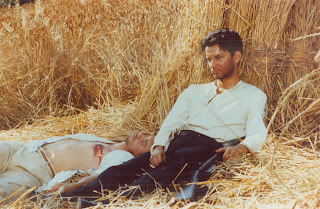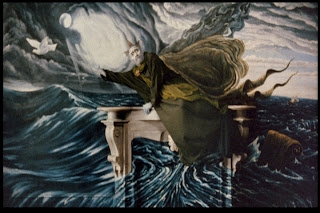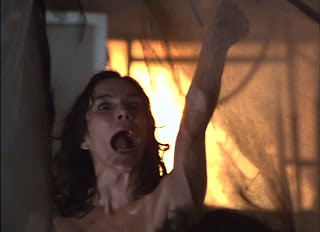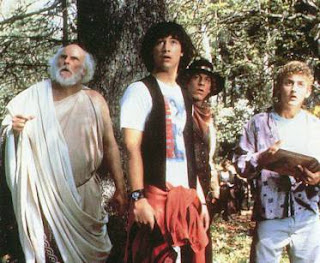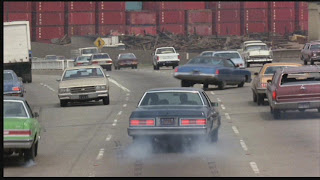
This is the first in a series of posts dealing with what I've been calling (to myself and to my friends) "The Golden Age of American Action Movies".
First: what's the purpose, here?
Well, one of my favorite "traditions" of American cultural criticism/analysis/history is the belated championing of an overlooked/under-appreciated pop-art form as an Important Contribution to American (or even World) Culture. Think: Jazz, the Newspaper comic strip, the Broadway Musical, the "Underground" comic book, soul music, etc. I want a piece of that action!
Plus - I think these movies are under-appreciated. Film buffs/critics often look down on them as "popcorn movies" or enjoy them sheepishly as "guilty pleasures". But at their best they're more than that, and, moreover, they're doing something that can only be done in movies: seamlessly combining big screen spectacle and genuine human scale drama.
Second: when, exactly, was the "Golden Age of the American Action Movie"?
Remember that I see blogging as part of an open, ongoing discussion and don't take this as the only answer to the question, but, for our purposes right here, right now, at the beginning of the conversation, I'm going to say that the Golden Age started around 1982, reached its apotheosis in the years around 1990, and petered out over the mid-to-late 1990s.
Concrete examples might help:
First Blood, from 1982, is one of the movies that ushers in the Golden Age.
Die Hard, from 1988, is the Golden Age action movie at its best.
It's a little bit harder to find an end point because of a number of stragglers, but movies like Con Air and Face/Off from 1997 both, for different reasons (which will hopefully become more clear as we go on), indicate the waning of the Golden Age. It is essentially over as a major film "movement" by 1999, when The Matrix heralds the arrival of a new school of action filmmaking .
The important context: the age of blockbusters, B-movies with big budgets, an audience of young men with money to spend, a growing international market.
(I'd just like to mention that I'm sure someone will read all this and be like: "Well, what you should really be paying attention to are the Drive-In action/exploitation pictures of the 1970s, blah, blah, blah." Well, yeah - I like those movies, too. Especially Rolling Thunder. But we're not talking about those movies here and they're already much-loved by film buffs.)
Third: what else, aside from when and where it was made, makes a given action movie a part of "the Golden Age of American Action Movies"? I.e., is there some style or idiom these movies all share?
Well, yes, in fact, I think so. Or, for the purposes of this conversation, let's at least propose a few.
A. Getting this out of the way first: they're action movies. That is, character and theme are revealed through scenes involving physical - usually martial - conflict and risk. Arguably, they should be primarily action-driven. So, like, Heat, despite having one of the key action sequences of the era, is an outlier or a liminal case - it's probably more of a crime melodrama than a genuine action movie. But, like I said, "arguably".
B. They share two major stylistic/formal elements: (1) a commitment to surface realism and (2) spatial integrity is the cohering idea behind their action sequences. Ugh - that's ugly and jargon-y. Let's see if I can unpack it a little:
What I mean by "surface realism": despite the craziness of the situation, despite the often superhuman feats, despite the frequent fudging of the laws of physics, Golden Age Action Movies present everything with a straight face. There's no stylization or attempt to put quotation marks around any of the action.
So, yes, these means I'm leaving out movies that directly show the influence of "Blood Poets" like Sam Peckinpah or Sergio Leone. Golden Age Action are no-nonsense spectacles. (Brian De Palma's The Untouchables and Mission: Impossible are both stylistic outliers: they're unimaginable apart from the context of Golden Age Action Movies, but they're really standing outside the tradition, commenting on what's going on inside it.)
What I mean by "spatial integrity is the cohering idea": well, this is a little trickier and I'd welcome any questions that will help to make this as clear as possible.
I've got this notion that one of the features of a good action movie is a unifying approach to the action sequences. Now, different action movies might take different approaches. For instance, The Bourne Supremacy takes what I would call the impressionistic route. The "cohering idea" behind its action sequences is to give the audience the impression of what being in a high impact, high speed fight/chase/etc. might be like. This is realized through: lots of quick cuts, hand-held camera work, purposefully chaotic fight choreography. Face/Off (along with a lot of other John Woo movies) takes an expressionistic approach. So, saying that the approach emphasizes "spatial integrity" is partly just reiterating the commitment to surface naturalism, but it is also showing their allegiance to the mainline of Hollywood narrative filmmaking exemplified by something like Howard Hawks's Rio Bravo. In other words, these movies aim for scenes that make sense spatially in terms of how everything is happening. Not that there isn't fudging and not that the integrity isn't really an illusion.
Ok - so, that's out of the way.
Next up: talking about some specific movies, starting with Speed. But, to get in the right frame of mind for what's to come, check out our T-2 "round-table" from earlier this year and Sean Collins's recent post on Shoot 'em Up.
